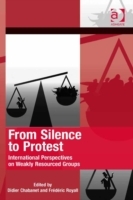Detailansicht
From Silence to Protest
eBook - International Perspectives on Weakly Resourced Groups
ISBN/EAN: 9781409467984
Umbreit-Nr.: 7645467
Sprache:
Englisch
Umfang: 288 S.
Format in cm:
Einband:
Keine Angabe
Erschienen am 28.11.2014
Auflage: 1/2014
E-Book
Format: EPUB
DRM: Adobe DRM
- Zusatztext
- The editors of this book examine social movement scholars use of contemporary concepts and paradigms in the study of protest as they analyse the extent to which these tools are valid (or not) in very different regional - and thus political or cultural - contexts.The authors posit that weakly resourced groups are a particularly useful point of departure to evaluate the strengths and weaknesses of three key social movement schools of analysis: resource mobilization, political opportunity structures, and frame analysis.Some of the groups considered in this volume are financially disadvantaged, lacking money and work; others are economically disadvantaged, with members having precarious, part-time, or short-term jobs; some are socially disadvantaged, with fragile networks of solidarity; others are culturally disadvantaged, with members continuously victimized, stigmatized and rejected; finally some are politically disadvantaged when they have little or no access to decision-making structures. These exclusionary factors can be cumulative and give way to different outcomes.The chapters cover a large range of examples including urban riots in France and in Great Britain, the World Social Forums of Dakar and Nairobi, the struggles of precarious workers in Italy and Greece, unemployed mobilization in Germany and Ireland, the mobilization of the Roma and Muslims in Europe, the Brazilian landless movement, the mobilization of small farmers in France, as well as mobilization in authoritarian states such as Morocco and Cuba.This book will be of interest to scholars, students and activists working within social movement studies.
- Kurztext
- The editors of this book examine social movement scholars use of contemporary concepts and paradigms in the study of protest as they analyse the extent to which these tools are valid (or not) in very different regional - and thus political or cultural - contexts.The authors posit that weakly resourced groups are a particularly useful point of departure to evaluate the strengths and weaknesses of three key social movement schools of analysis: resource mobilization, political opportunity structures, and frame analysis.Some of the groups considered in this volume are financially disadvantaged, lacking money and work; others are economically disadvantaged, with members having precarious, part-time, or short-term jobs; some are socially disadvantaged, with fragile networks of solidarity; others are culturally disadvantaged, with members continuously victimized, stigmatized and rejected; finally some are politically disadvantaged when they have little or no access to decision-making structures. These exclusionary factors can be cumulative and give way to different outcomes.The chapters cover a large range of examples including urban riots in France and in Great Britain, the World Social Forums of Dakar and Nairobi, the struggles of precarious workers in Italy and Greece, unemployed mobilization in Germany and Ireland, the mobilization of the Roma and Muslims in Europe, the Brazilian landless movement, the mobilization of small farmers in France, as well as mobilization in authoritarian states such as Morocco and Cuba.This book will be of interest to scholars, students and activists working within social movement studies.
